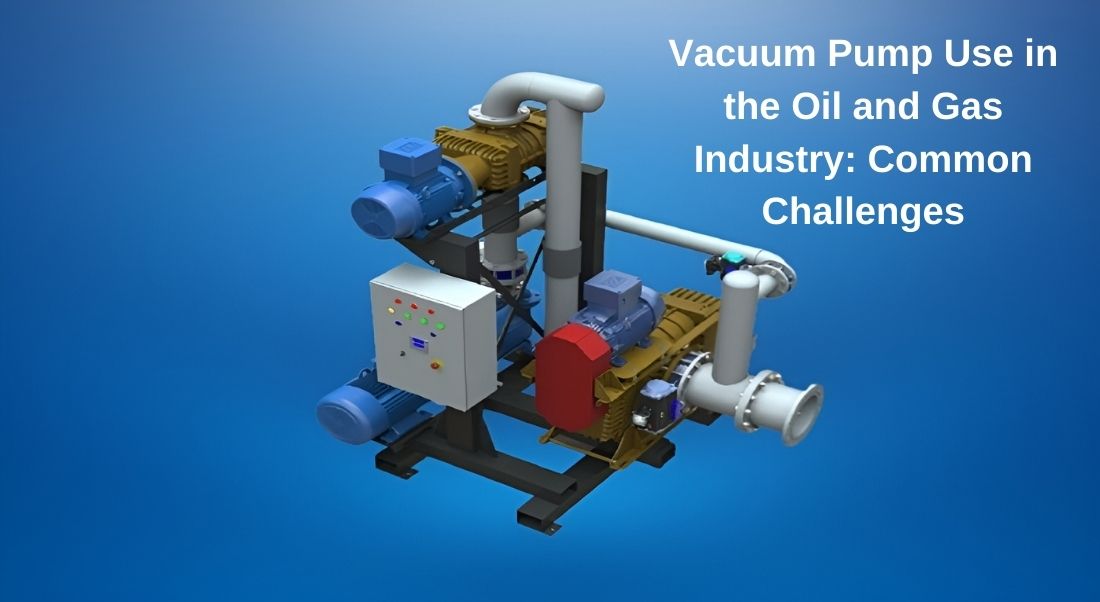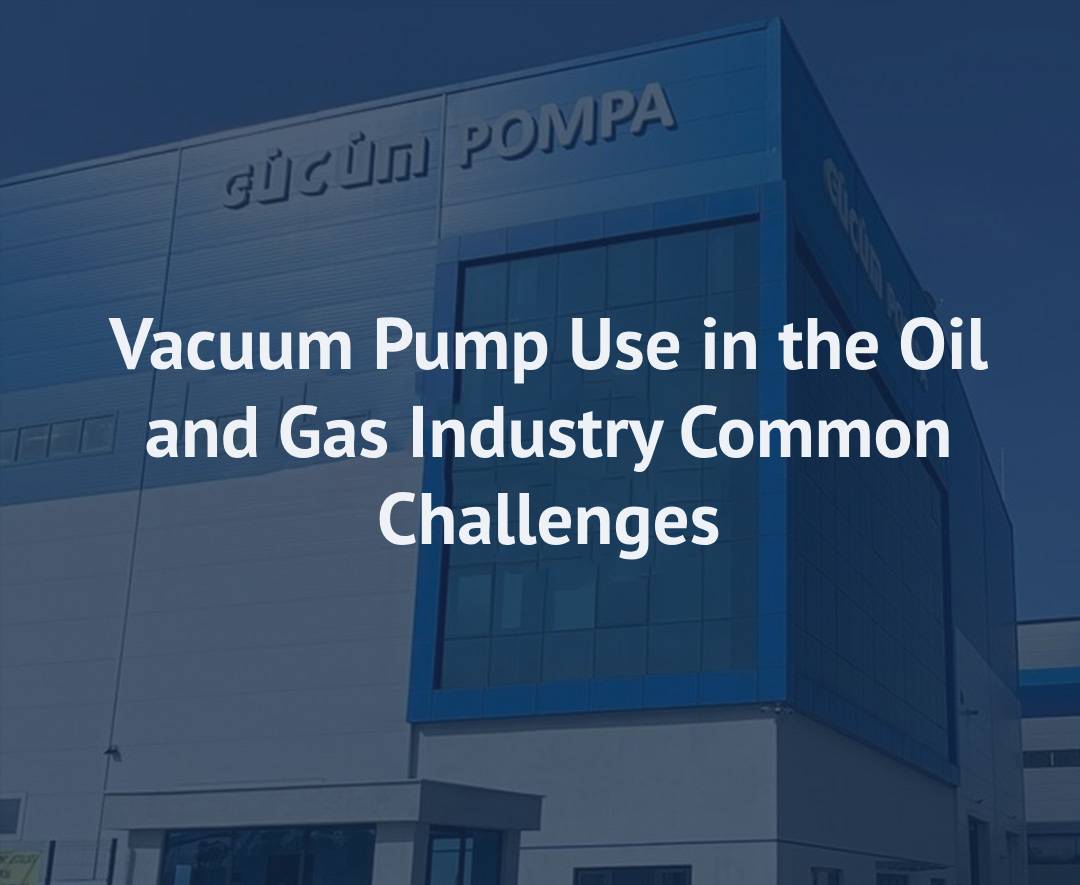Vacuum Pump Use in the Oil and Gas Industry: Common Challenges
Use of Vacuum Pumps in the Oil and Gas Industry: Common Challenges
The oil and gas industry plays a critical role in meeting global energy demand. This industry involves complex and high-precision processes for the production, processing, and transportation of oil and natural gas. In these processes, technologies such as vacuum pumps are essential for improving efficiency and optimizing operations. However, the use of these pumps also presents several challenges. While the correct use of vacuum pumps in the oil and gas industry is crucial for efficiency and safety, there are technical and operational obstacles that need to be overcome. This article will explore the use of vacuum pumps in the oil and gas industry and examine the primary challenges encountered.
The Role of Vacuum Pumps and Their Application in the Oil and Gas Industry
A vacuum pump is a device that creates a low-pressure (vacuum) environment by drawing air or gas out of a space. In the oil and gas industry, these pumps facilitate various operations such as gas separation, distillation, drying, liquid transport, and the creation of vacuum conditions in reactors. A vacuum environment is critical in many processes to ensure they are carried out efficiently. For example, in pipeline operations, production facilities, and refineries, vacuum pumps are widely used for gas separation and liquid transport. Additionally, vacuum distillation processes help separate components of oil and chemical products while controlling temperatures.
Applications of Vacuum Pumps and Their Roles
Vacuum pumps have a broad range of applications in the oil and gas industry. These pumps play a key role in gas separation, liquid transport, distillation, drying, and reactor vacuuming. Each application requires precise control of vacuum levels. Below are some of the key areas where vacuum pumps are used:
Gas Separation and Transport
In oil and gas production facilities, gas separation is an important process. Vacuum pumps are used to separate gases, especially in petrochemical and refining processes. Vacuum-assisted gas separation allows gases to be more efficiently separated, speeding up transport operations. This reduces energy consumption and shortens processing times.
Distillation
Vacuum distillation is commonly used in oil refineries and chemical processing facilities. This process allows for the separation of components based on differences in their boiling points. By using a vacuum, the boiling points of these components are reduced, and distillation can take place at lower temperatures. This method provides energy savings and helps preserve sensitive compounds. Vacuum distillation is especially useful for separating components with high boiling points.
Drying and Liquid Extraction
Drying processes in the oil and gas industry are often carried out using vacuum pumps. Vacuum drying creates a low-pressure environment that facilitates the evaporation of liquids. When dealing with heat-sensitive materials, vacuum systems are preferred since they allow for drying without exposing materials to high temperatures, preventing quality loss. Additionally, vacuum pumps are also essential for liquid transport processes.

Reactor Vacuuming
During oil and gas processing, vacuum conditions are necessary for reactors. Vacuum environments accelerate chemical reactions and can help prevent unwanted side reactions. In addition, processes carried out under vacuum conditions are typically more efficient and controllable, which is why they are commonly used in industrial facilities.
Common Challenges Faced in the Use of Vacuum Pumps in the Oil and Gas Industry
While vacuum pumps are crucial to the oil and gas industry, several challenges are encountered during their use. These challenges are often related to environmental factors, technical requirements, and system maintenance needs. Below are some of the common challenges faced when using vacuum pumps in this sector.
High Energy Consumption
The oil and gas industry involves large-scale operations, which means that the vacuum pumps used can consume a significant amount of energy. In large facilities, vacuum pumps often operate at high power levels continuously. This leads to increased energy costs and environmental impacts. Vacuum pumps with low energy efficiency can increase operational costs. Therefore, adopting more efficient vacuum pumps can reduce energy consumption and lower overall expenses.
Maintenance and Downtime
Vacuum pumps in the oil and gas industry are exposed to harsh working conditions. External factors such as dirt, corrosive substances, and high temperatures can negatively affect pump performance. Wear and tear and corrosion can reduce the lifespan of the pumps and lead to failures. Such breakdowns can cause production delays. Regular maintenance and monitoring can help prevent these problems, but maintenance processes are often time-consuming and may result in production disruptions.
Corrosion and Wear
Vacuum pumps in the oil and gas industry are constantly exposed to environmental factors that can cause corrosion and wear. Chemical processes, especially those involving aggressive substances, can lead to the degradation of pump components. Corrosion reduces the efficiency of the pumps and increases maintenance costs. To prevent this, vacuum pumps need to be made of durable materials, such as stainless steel or titanium, which can withstand harsh conditions and extend the pump's life.
Vacuum Level Control
In the oil and gas industry, accurate control of vacuum levels is crucial. Different processes require different vacuum levels, and incorrect vacuum levels can negatively affect efficiency. Excessively high vacuum levels can lead to increased energy consumption, while low vacuum levels may reduce process efficiency. As a result, maintaining precise vacuum control is essential. Any changes in the system can affect the vacuum level, leading to inefficiencies in the processes.
Environmental Impact and Leaks
During oil and gas production, vacuum systems may experience leaks that can lead to environmental issues. These leaks can cause harmful gases to escape into the environment, posing safety risks and contributing to pollution. Gas leaks typically result from faulty pump installations or inadequate maintenance. To prevent this, stringent maintenance programs and regular inspections are necessary. Moreover, quick detection and resolution of leaks are crucial for minimizing environmental impact.
High Initial Costs
Installing vacuum pumps, especially in large oil and gas processing facilities, involves high initial costs. These initial investment costs can be a significant barrier for small and medium-sized enterprises. Additionally, pumps designed for specialized needs may come at an even higher price. The high initial costs of vacuum pump installations can make it difficult for businesses to invest in technologies aimed at improving operational efficiency.
Selecting Vacuum Pumps for Efficiency
The proper selection of vacuum pumps is critical for overcoming the challenges faced in the oil and gas industry. The right pump, chosen according to process requirements, can reduce energy consumption, lower maintenance costs, and improve overall process efficiency. Furthermore, correct vacuum levels ensure optimized results for each specific operation.
Energy Efficiency and Performance
Energy efficiency is one of the most important factors to consider when selecting a vacuum pump in the oil and gas industry. High-energy-efficient pumps can significantly reduce operational costs. These pumps allow for higher performance with lower energy input, leading to cost savings and contributing to environmentally friendly production processes.
Durability and Longevity
Vacuum pumps with long lifespans reduce maintenance costs and minimize production downtime. Pumps made from durable materials can withstand harsh working conditions and provide long-term service. This is particularly important in systems exposed to abrasive environments and high temperatures.
Vacuum Pump Maintenance and Management
To ensure vacuum pumps operate efficiently, regular maintenance is essential. Maintenance improves pump performance and extends its lifespan. Additionally, it helps detect and prevent potential breakdowns early. Proper maintenance of vacuum pumps in harsh conditions improves both safety and productivity in industrial processes.
